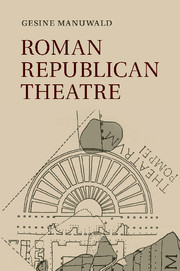Book contents
- Frontmatter
- Contents
- Preface
- Technical notes and abbreviations
- Introduction: previous scholarship and present approach
- PART I CULTURAL AND INSTITUTIONAL BACKGROUND
- PART II DRAMATIC POETRY
- 3 Dramatic genres
- 4 Dramatic poets
- 5 Dramatic themes and techniques
- Overview and conclusions: Republican drama
- Bibliography
- Index
Overview and conclusions: Republican drama
Published online by Cambridge University Press: 05 July 2011
- Frontmatter
- Contents
- Preface
- Technical notes and abbreviations
- Introduction: previous scholarship and present approach
- PART I CULTURAL AND INSTITUTIONAL BACKGROUND
- PART II DRAMATIC POETRY
- 3 Dramatic genres
- 4 Dramatic poets
- 5 Dramatic themes and techniques
- Overview and conclusions: Republican drama
- Bibliography
- Index
Summary
Although it has been claimed that it is impossible to produce a ‘history of Roman drama’, this study has tried to collect and discuss all the material that could form the basis of such an attempt. Whether one believes that a coherent narrative against this background is sensible or can be successful presumably depends on the definition of ‘(literary) history’ and the assessment of the surviving evidence. Because of these problems, the following outline, though based on the available data and the arguments presented in the body of this study (not repeated here), should be seen as tentative. Nevertheless, it seems worthwhile to draw together information and insights that are distributed over the preceding chapters. Preliminary conclusions have been presented in individual sections; the purpose of this final chapter is to combine the results, achieved by looking at the ma- terial from a variety of angles, into a coherent presentation. It might sound too coherent and slightly simplified in places, but this is an unavoidable consequence of a narrative exposition and necessary for a comprehensible presentation of possible developments and connections.
When Roman literary drama came into being in the mid-third century bce, Greek drama had already existed for centuries, gone through several stages and spread from Athens to other parts of the Mediterranean. Besides, various indigenous forms of ‘pre-literary’ dramatic performances were in existence all over Italy.
- Type
- Chapter
- Information
- Roman Republican Theatre , pp. 331 - 352Publisher: Cambridge University PressPrint publication year: 2011



